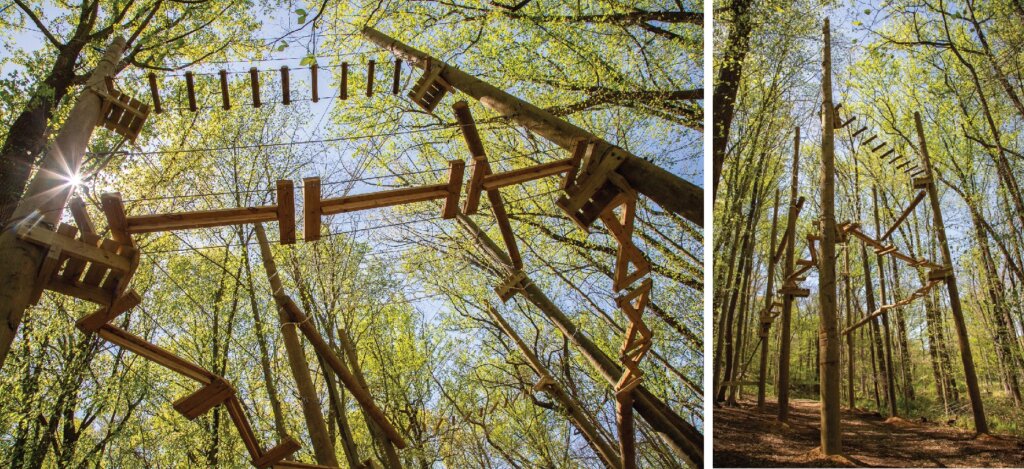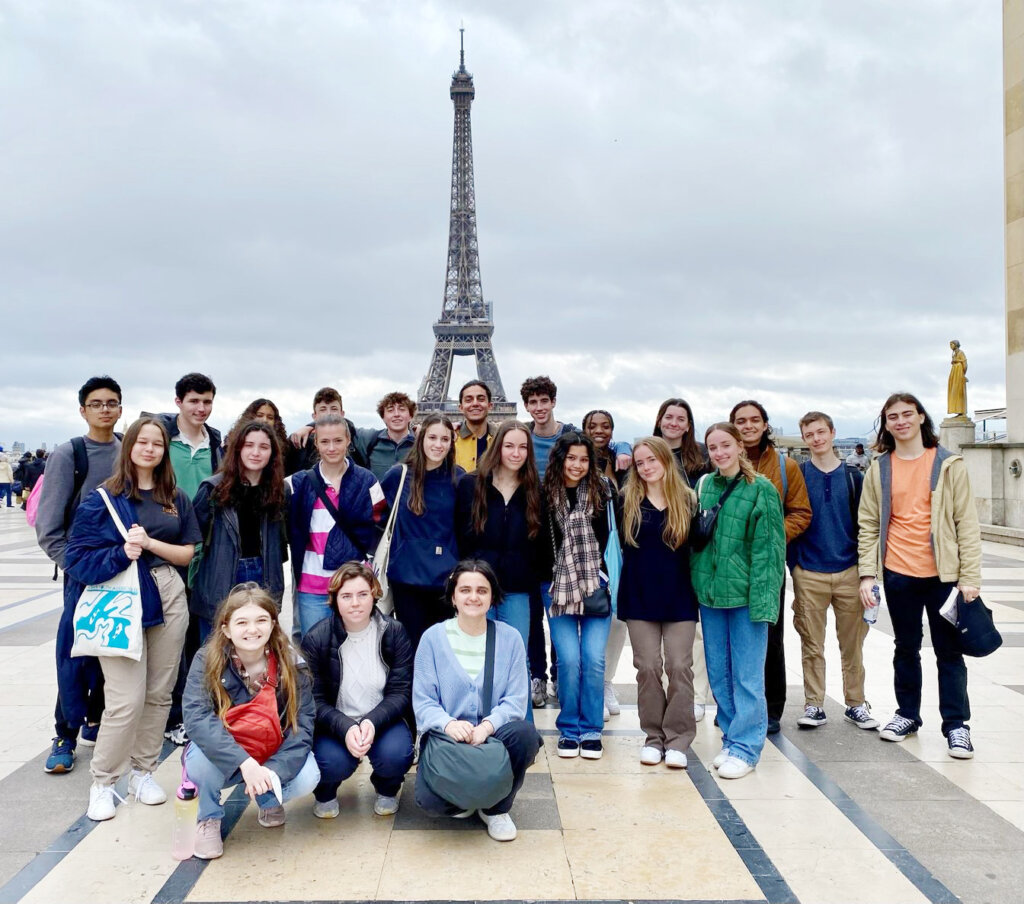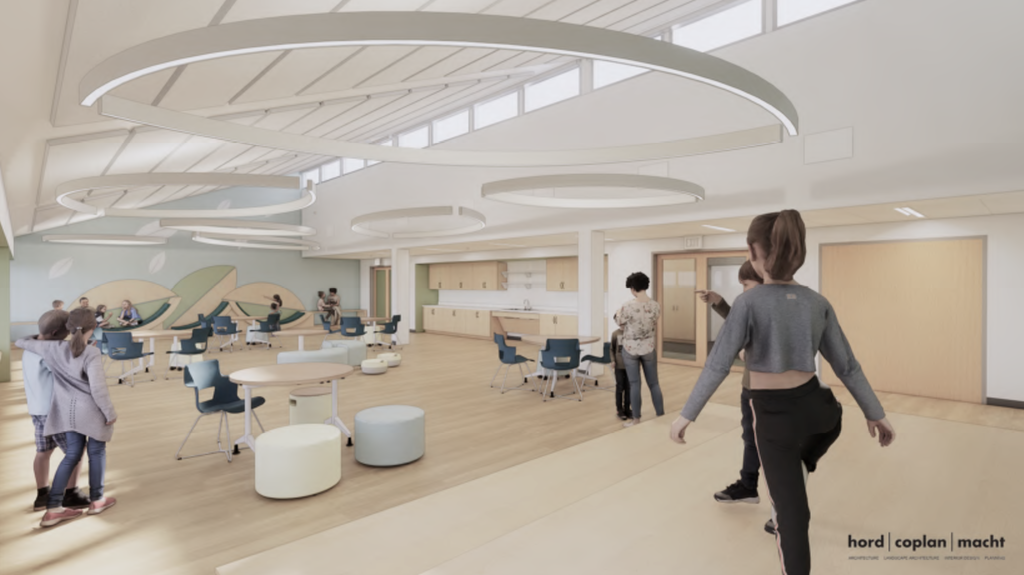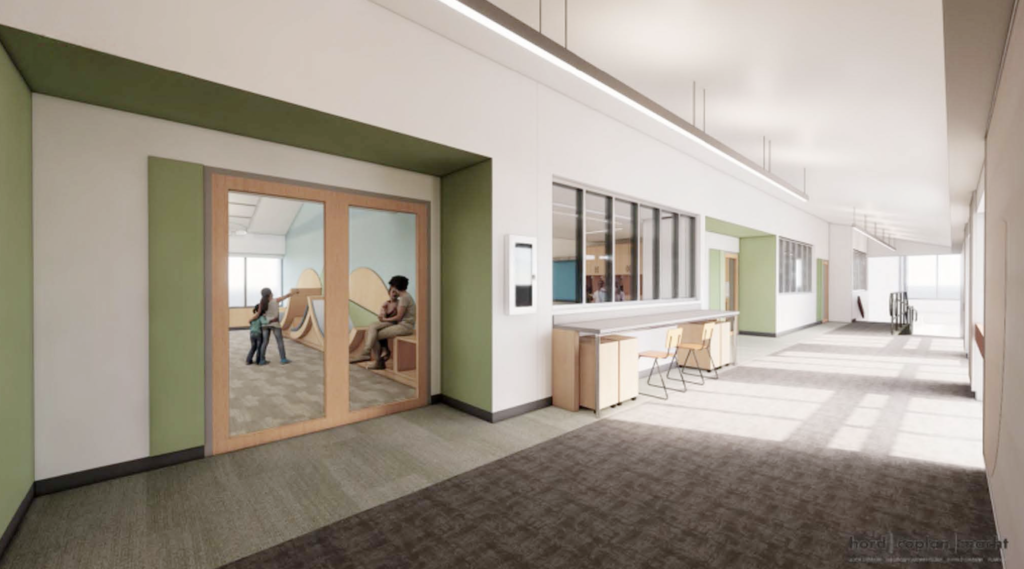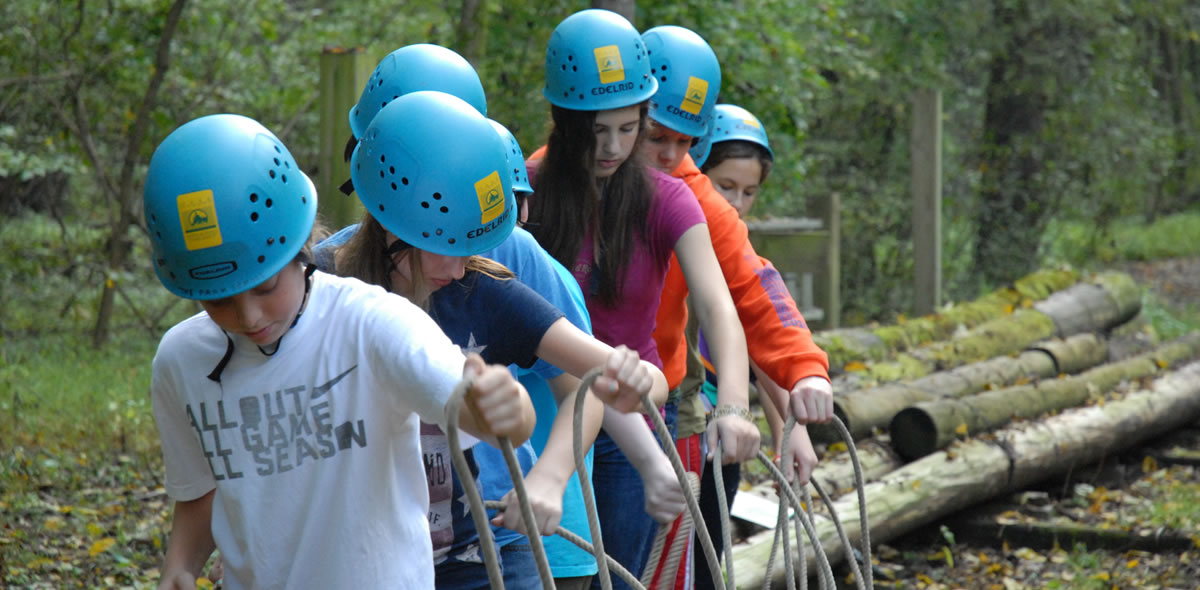Challenge Course
When initiated in 1974, Park’s program was one of only 12 in the country. One of the largest courses in the mid-Atlantic region, it was originally constructed, maintained, and taught by students.
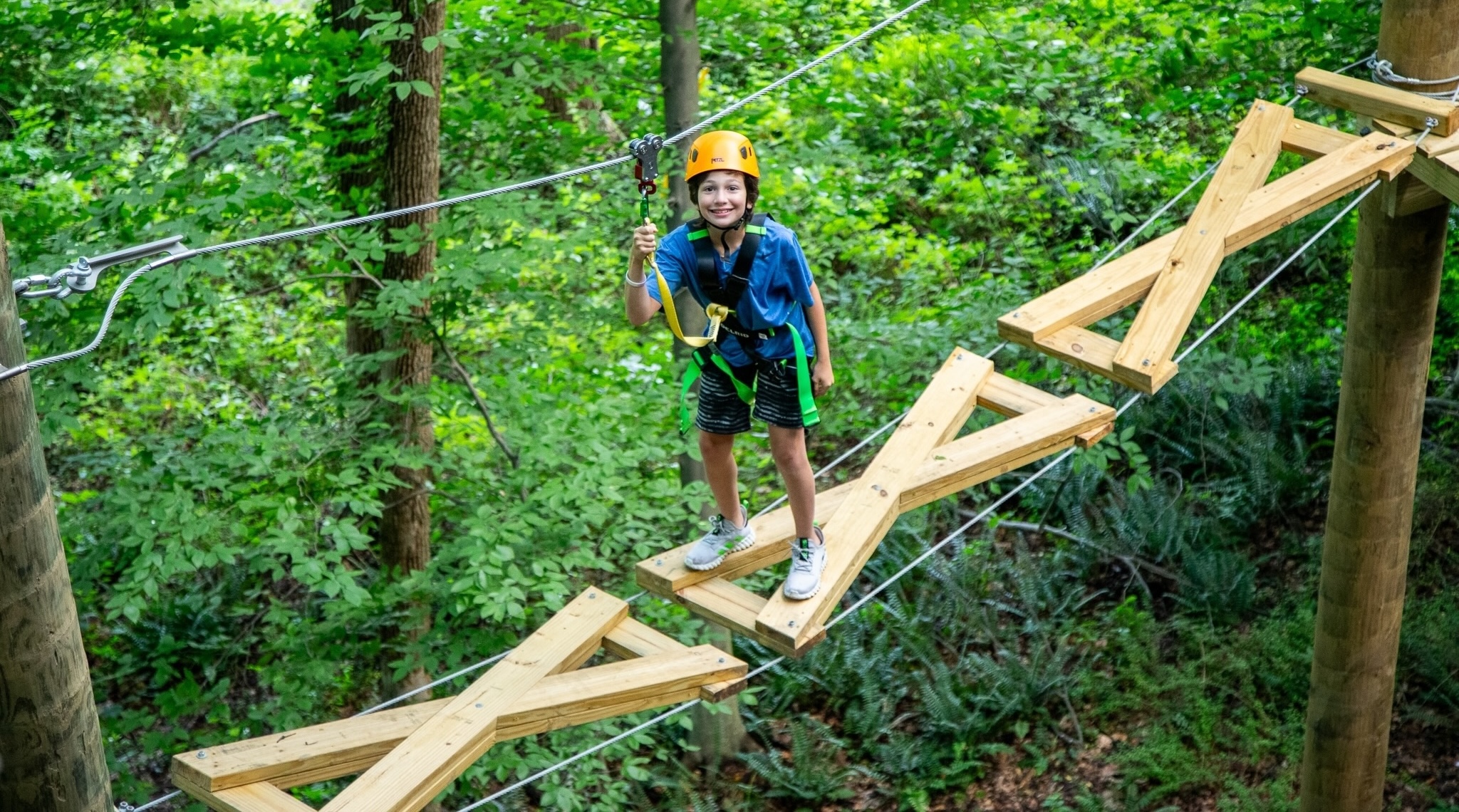
In 2024, Park installed a new course that retained the core values and historical essence of the original, while incorporating brand new state-of-the-art equipment.
Park’s challenge course and the programs that we run on it provide outdoor experiential learning opportunities for students Pre-K through Grade 12. Our team building structures and aerial adventure activities provide meaningful opportunities for students to take healthy risks, get outside of their comfort zones, build resilience, and forge connections with each other as they tackle initiatives — both individually and collectively — over the course of each school year.
Our challenge course experiences are guided by the “challenge with choice” philosophy, which encourages students of all ages to develop a deeper understanding of their potential when faced with a challenge. All of our experiences are facilitated by trained instructors, who create a supportive environment that welcomes mistakes and inspires students to experiment and explore.
Through our intentional programming, students in all three divisions are provided with opportunities to visit the challenge course as part of classroom curriculum, and also through a variety of recreational activities that take place outside of the school day.
Connected to the Curriculum
What is the goal of Lower School challenge course programming?
Lower School adventure programming is designed to spark excitement and curiosity for the outdoors as well as create a foundation for deeper experiences in Middle School. We encourage students to try new things and build their confidence with a special focus on programming that gets the entire family outdoors.
How do we accomplish this in Lower School?
Throughout the school year, we provide opportunities for students and their families to participate in three seasonal community events — one in fall, winter, and spring. They are designed with our Lower School students and their families in mind, promoting shared experiences and family bonding in outdoor spaces. Events include activities like rock climbing, zip lining, biking, hiking, campfire cooking, and camping.
Why is this important for the Lower School program?
Challenge course programming helps Lower School students build confidence, work on crucial interpersonal skills, and learn how to be curious about new things. Adventure activities help children learn the value of stepping outside of their comfort zones from an early age, and help them develop the trust necessary to feel safe while doing so. These skills are crucial for Lower School students as they move towards Middle School, where they will be challenged in new and different ways at Park, in and out of the classroom.
What is the goal of Middle School programming?
Building on the experiences in Lower School, adventure programming in Middle School is designed to help students strengthen their ability to collaborate and introduce basic leadership skills. Programming is designed to build critical thinking, communication, problem-solving, and conflict resolution skills using a variety of physically and mentally challenging team building activities, which rely on each student’s ability to lead and listen, as well as accommodate others.
How do we accomplish this in Middle School?
We accomplish this through a variety of engaging, hands-on team building experiences that focus on interpersonal skills. Each grade level participates in a full day of team-building activities during their grade level retreat, where students participate in both team building activities as well as an aerial adventure activity. Students build community with each other as they navigate activities in small groups. This encourages students to continue stepping out of their comfort zone when things feel challenging or frustrating. These activities challenge students to find ways to work together toward a shared goal, fostering the resilience and confidence needed to be successful in and outside of school.
In addition to the grade level retreats, students may choose to participate in special events like rock climbing, high ropes, hiking, camping, zip lining, and more. These optional activities provide opportunities to face new challenges for students who enjoy the outdoors and adventure activities.
Why is this important for the Middle School program?
Students in Middle School are starting to develop a stronger sense of their community and who they are as an individual within that community. Challenge programming helps students explore this in ways that challenge their perspectives, get them to consider the perspectives/experiences of others, and gives them a safe space to try out different roles and leadership skills as they learn how to accommodate and understand others with empathy. Research shows that experiential learning has the highest impact when it comes from a place of self-efficacy, and the program is designed to help Middle School students find their decision making voice, learning how to overcome perceived barriers along the way. As students move into Upper School, these skills will provide the foundation for a higher level of independence, larger community of peers, and challenging coursework that thrives on the abilities of Park students to be curious and think outside of the box.
What is the goal of Upper School challenge programming?
Building on the Middle School programming, Upper School provides more complex problem-solving initiatives and experiences that help students navigate healthy risks on the course. We encourage more reflective thinking about how challenge course experiences relate to real life experiences, pushing students to build deeper interpersonal connections along the way, develop advanced leadership skills, and prepare for real-world challenges that extend beyond the classroom.
How do we accomplish this?
Ninth and tenth Graders continue to deepen team-building skills while our trained facilitators ask them to reflect more about how their experiences translate to their everyday lives. Activities become more complex as students take on the challenge of tasks that require high levels of trust and collaboration, such as lifting one another and spotting, once they demonstrate readiness. Facilitators adjust group dynamics to push students to take on different leadership roles and provide a new level of challenge and healthy risk.
For students passionate about the outdoors, adventure activities, and leadership development, the program provides additional opportunities to explore topics like outdoor safety, aerial adventure, team-building facilitation, diversity and inclusion in outdoor spaces, and gear maintenance.
Climbing Wall
Our three-sided outdoor wall features six routes with different types of holds and angles, providing a variety of difficulty levels for climbers to choose from. Climbers are belayed by instructors for the duration of their climb and reach heights up to 36 feet.
Nessie
Nessie is a team-based challenge where a climber in the air relies on their team on the ground to work together to balance and stabilize wooden planks using attached ropes as the climber navigates across them.
High Ropes Course
On our two-level course, participants navigate a variety of obstacles, including wooden bridges, cargo nets, and cable crossings, all suspended between platforms. Climbers can tackle the course at their own pace, facing increasing challenges as they ascend.
Giant Swing
The giant swing is an exhilarating team-based experience that works by having a team of participants gradually lift someone 40 feet in the air before the rider releases themselves into a thrilling freefall.
Flying Squirrel
The Flying Squirrel is a team-based experience that is often used as a precursor to the giant swing element. Participants are hoisted into the air by their teammates, who work together to pull them 40 feet in the air. Participants will swing side to side as they are raised to the top before being slowly lowered back to the ground.
Pamper Pole
The Pamper Pole is a bold challenge that tests courage and focus. Participants climb a very tall telephone pole, and at the top, must leap off into the air to touch a hanging rope set out as a target. They are then lowered to the ground slowly.
Climbing Tower
The climbing tower features three sides, each offering a variety of challenging obstacles like cargo nets, tires, swinging ladders, and more. With different routes and difficulty levels on each side, the tower offers a climbing experience that encourages both individual effort and team support, as some routes are impossible to accomplish without a partner.
Zip Line
The zip line starts at the very top of our hiking trails and crosses over the pool, offering an exciting aerial experience. Participants are clipped in by an instructor at the launch platform and get dismount assistance from an additional instructor at the landing platform. We use a high tech braking system that creates an easy, automatic process allowing participants to simply enjoy their ride.
Low Ropes/Team Building
Our low ropes course is designed to promote teamwork, communication, and problem-solving in a supportive, low-risk environment. These ground-based activities do not require the use of helmets or harnesses, rather participants are responsible for using safe spotting and lifting techniques as necessary. The course emphasizes collaboration, trust, and creative thinking, making it an ideal experience to strengthen relationships, build confidence, and improve group dynamics.

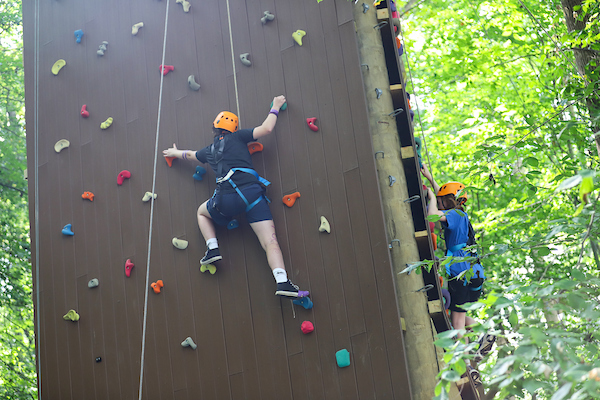
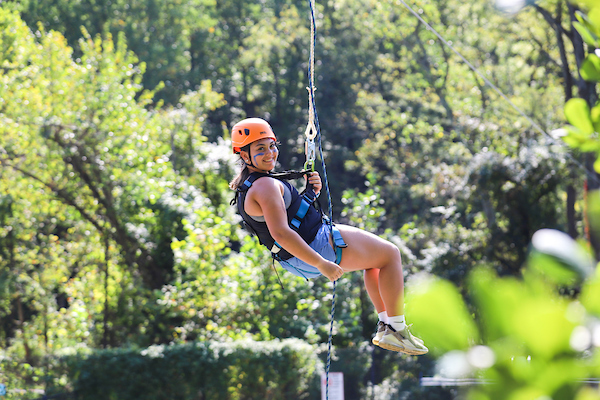
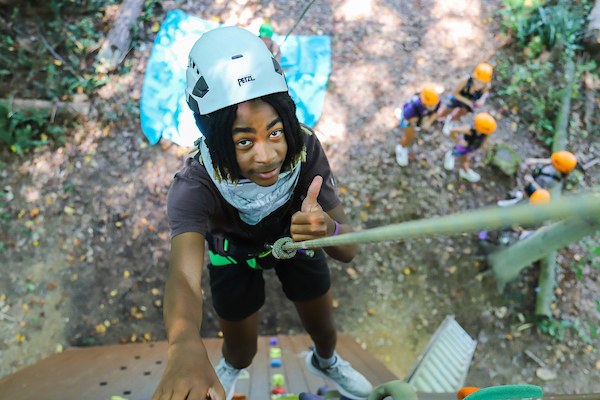
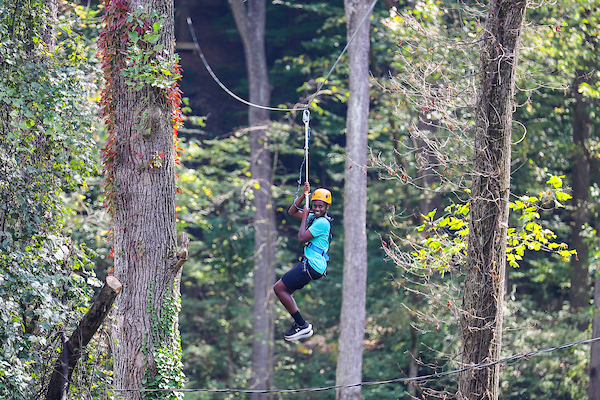
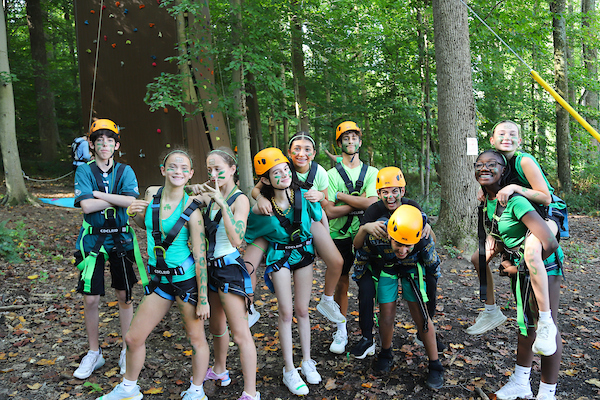
For questions about the challenge course program, please contact Challenge Course Coordinator Emily Minter.

